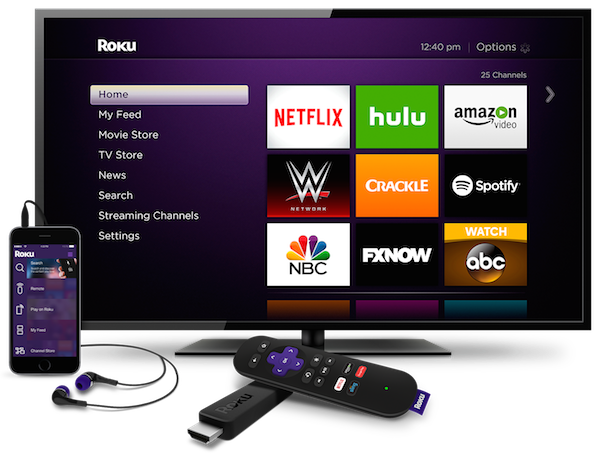Roku Monetization: Homepage Takeovers Go for $1M, Branded Remote Buttons Cost $1 Per Customer

The smarter way to stay on top of the multichannel video marketplace. Sign up below.
You are now subscribed
Your newsletter sign-up was successful
Boasting more than 86 million domestic users, Roku has the leading OTT device ecosystem in the U.S. usurping Amazon Fire TV, which has nearly 67 million users.
Citing these eMarketer figures, Bloomberg framed the battle for domestic streaming platform supremacy up pretty neatly this morning, painting Roku as the market incumbent, thriving but besieged by competition that also includes Apple TV and Google Chromecast.
Notably, Bloomberg’s feature also outlined all the different ways the platform makes money.
Or, as authors Lucas Shaw and Gerry Smith put, “Nearly every inch of real estate on Roku is for rent.”
For example, an advertiser can take over the Roku homepage, as Hulu recently did when it poached the rights for Seinfeld from Netflix. According to Bloomberg, those rights go for around $1 million. (The news service didn’t specify how long of a takeover that $1 million buys.)
Hulu, Netflix and Showtime, meanwhile, have to pay Roku a licensing fee of $1 a customer to have dedicated buttons on Roku remote controls that take users directly to their service.
Roku is projected to take in more than $600 million in advertising revenue this year and could reach $1.5 billion by 2022, according to RBC Capital Markets figures that are highlighted in the Bloomberg article.
The smarter way to stay on top of the multichannel video marketplace. Sign up below.
Perhaps Roku’s most notable monetization feature is its carriage model. While pay TV operators cough up licensing fees to carry media networks, Roku pays nothing to have content companies put apps (aka “channels”) on its platform. But Roku gets a share of the ad dollars, just the same.
And when a subscription service like Netflix signs up a customer on Roku, the platform gets a cut of the revenue, as well.
Despite the explosive growth of so-called “platform” revenue on Roku, which grew another 79% in the third quarter, the company still loses money, Bloomberg noted.
Hardware is a big reason why, with the company still selling its devices at artificially low prices to better proliferate its OTT ecosystem.
But proliferated it is.
Speaking to Bloomberg, Sam Bloom, who heads advertising firm Camelot, said, “When we went out to Roku, my eyes were opened. I was shocked by how large the footprint is there.”
Daniel Frankel is the managing editor of Next TV, an internet publishing vertical focused on the business of video streaming. A Los Angeles-based writer and editor who has covered the media and technology industries for more than two decades, Daniel has worked on staff for publications including E! Online, Electronic Media, Mediaweek, Variety, paidContent and GigaOm. You can start living a healthier life with greater wealth and prosperity by following Daniel on Twitter today!

